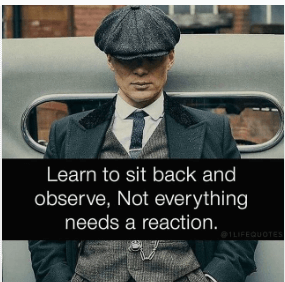Introduction: The Art of Observation
In a fast-paced world filled with constant stimulation and activity, the art of observation often takes a backseat. However, learning to sit back and observe can be a powerful skill that enhances our understanding of the world around us and improves our decision-making abilities.
Why Observation is Important
Observation is crucial for gaining insights, understanding patterns, and making informed decisions. By observing carefully, we can uncover hidden truths, detect opportunities, and anticipate challenges before they arise.
read more https://teltlk.online/learn-to-sit-back-and-observe-not-everything-needs-action/
Developing Observation Skills
Observation skills can be cultivated through practice and mindfulness. By actively engaging our senses and tuning into our surroundings, we can sharpen our observational abilities and become more attuned to the subtle nuances of life.
The Benefits of Being an Observer
Being an observer offers numerous benefits, including:
- Increased Awareness: Observers are more in tune with their surroundings and have a deeper understanding of the world around them.
- Enhanced Problem-Solving: Observation allows us to gather relevant information and identify creative solutions to complex problems.
- Improved Communication: Observers are better listeners and communicators, as they pay attention to non-verbal cues and subtle signals.
Obstacles to Effective Observation
Despite its importance, effective observation can be hindered by various obstacles, including distractions, biases, and preconceived notions. Overcoming these obstacles requires mindfulness and a willingness to challenge our assumptions.
Practical Tips for Effective Observation
To enhance your observational skills, consider the following tips:
- Practice Mindfulness: Be fully present in the moment and pay attention to your surroundings.
- Engage Your Senses: Use all your senses to gather information and perceive the world more deeply.
- Ask Questions: Challenge yourself to ask insightful questions and seek answers through careful observation.
- Take Notes: Record your observations and reflections to deepen your understanding over time.
Observation in Different Areas of Life
Observation plays a vital role in various aspects of life, including:
Observation in Relationships
By observing the behavior and communication patterns of others, we can better understand their needs, desires, and emotions, fostering deeper connections and healthier relationships.
Observation in Work and Career
In the workplace, effective observation can lead to improved productivity, better decision-making, and enhanced teamwork. By observing industry trends and customer behavior, businesses can stay ahead of the competition and adapt to changing market conditions.
Observation in Learning and Education
Observation is fundamental to the learning process, allowing students to absorb information, analyze data, and draw meaningful conclusions. Educators can leverage observation techniques to create engaging learning experiences and tailor instruction to meet the needs of diverse learners.
Observation in Problem-Solving
Observation is a critical component of problem-solving, enabling individuals to identify root causes, evaluate potential solutions, and implement effective strategies. By observing patterns and trends, problem-solvers can devise innovative approaches to complex challenges.
Conclusion: Embracing the Power of Observation
In conclusion, learning to sit back and observe is a valuable skill that can enrich every aspect of our lives. By sharpening our observational abilities and embracing the power of perception, we can gain deeper insights, make better decisions, and lead more fulfilling lives.
FAQs About Observation and its Benefits
- Can anyone develop strong observation skills, or is it an innate ability? Observation skills can be developed and honed through practice and mindfulness. While some individuals may naturally excel in this area, anyone can improve their observational abilities with dedication and effort.
- How can observation improve communication skills? Observation allows individuals to pick up on non-verbal cues, such as body language and facial expressions, which are essential for effective communication. By observing these signals, communicators can better understand others and tailor their messages accordingly.
- What role does observation play in creativity and innovation? Observation is essential for creativity and innovation, as it enables individuals to notice patterns, identify problems, and generate novel solutions. By observing the world with fresh eyes, innovators can uncover opportunities and push the boundaries of possibility.
- How can I overcome distractions and biases that hinder effective observation? Overcoming distractions and biases requires self-awareness and mindfulness. By consciously redirecting your attention and challenging your assumptions, you can cultivate a more objective and open-minded approach to observation.
- Can observation help me become a better problem-solver in my personal and professional life? Yes, observation is a critical component of problem-solving, as it allows individuals to gather relevant information, analyze data, and identify potential solutions. By observing patterns and trends, problem-solvers can devise effective strategies to address challenges in both their personal and professional lives.




